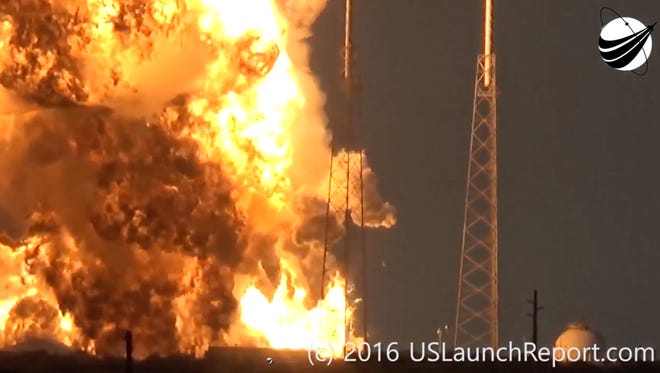SpaceX: Falcon 9 exploded after helium system breach

MELBOURNE, Fla. — A Falcon 9 rocket exploded during fueling on Sept. 1 after a "large breach" of the helium system that pressurizes an upper stage propellant tank, SpaceX said Friday.
The company reiterated that the rocket could return to flight as soon as November, while it continues to investigate "all plausible causes" of the breach.
SpaceX, however, said it has ruled out any connection to last year's in-flight breakup of a Falcon 9, which was attributed to a strut snapping in the same helium system that serves the upper stage's liquid oxygen tank.
“We will work to resume our manifest as quickly as responsible once the cause of the anomaly has been identified by the accident investigation team,” SpaceX said in a statement. “Pending the results of the investigation, we anticipate returning to flight as early as the November timeframe.”
SpaceX explosion one of many Florida launch failures
Led by SpaceX with Federal Aviation Administration oversight, the investigation team also includes NASA and Air Force representatives and industry experts.
In comments this month on Twitter, CEO Elon Musk did not eliminate the possibility that something had hit the rocket.
SpaceX said less than a 10th of a second passed from the start of the event that triggered a series of massive explosions and fireballs to vehicle data being lost.
About 3,000 data channels are being analyzed along with video, audio and images of the event.
The 230-foot Falcon 9 was being fueled for a test-firing of its nine main engines days before the planned launch of a commercial communications satellite.
A $200 million satellite was destroyed along with the rocket.

SpaceX said it has recovered and cataloged most of the debris from the explosion for inspection. The debris apparently was contained inside Launch Complex 40 at Cape Canaveral Air Force Station.
The company confirmed that “substantial areas” of the complex sustained damage, but said many facilities, including a nearby support building, fuel tanks and control systems, were unscathed or in “relatively good condition.”
It's unknown how long repairs might take, but SpaceX expects a launch pad just up the coast at Kennedy Space Center to be ready by November. The historic former Saturn V and space shuttle pad 39A has been undergoing renovations to support Falcon rocket launches.
SpaceX has not confirmed if it will fly next from Florida or California.
The company said it continues to produce rocket engines, tanks and other components as systems are cleared by the failure investigation.
Friday's update on the investigation was SpaceX's first public report since the day after the explosion. It came days before Musk is scheduled to deliver a speech at a conference in Mexico outlining his vision for how to colonize Mars.
Follow James Dean on Twitter: @flatoday_jdean